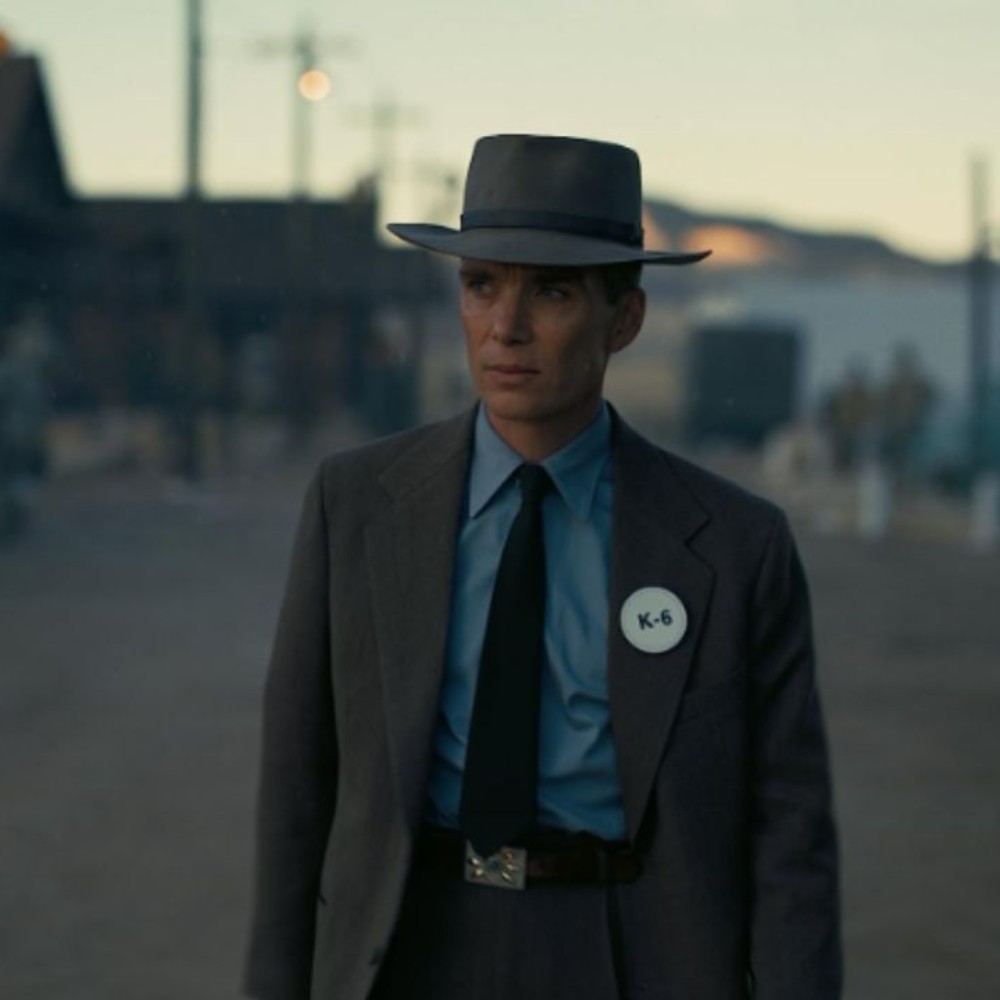Why Christopher Nolan's Oppenheimer Became The Star Of The 2024 Awards Season: Here's What We Think
The Award season seems to be leaning to one particular venture this year. And rightfully so, Oppenheimer is clinching the best of them all one event after the other. Here is what has made this Christopher Nolan movie stand out this year!
![Oppenheimer [Getty Images, Pinkvilla] Getty Images, Pinkvilla](https://www.pinkvilla.com/images/2024-02/1936072602_hollywood-lead.jpg)
After Tenet, Christopher Nolan's complex filmmaking did hit an unexpected plateau and the movie-going audience were questioning their own intellect more than that of the director. However, little did they know that Nolan's brilliance was about to serve them with something far beyond their imaginations. A Manhattan Project of his own was brewing in New Mexico. Here, the filming of Oppenheimer started in January 2022 in New Mexico and wrapped up in a span of six months. After casting half the Hollywood in it, it was clear that Nolan was up to no good. The waves of disruption could be seen from afar.
But it certainly is not the first time that Hollywood churned out a complex and controversial figure for a movie with an ensemble cast eyeing for an Oscar. So, how did Oppenheimer become the phenomenon that it is today? How did Christopher Nolan's brainchild become the star of the Award season? Here is our in-depth look into what worked for the movie from several perspectives.
![Oppenheimer [IMDb] Oppenheimer [IMDb]](https://www.pinkvilla.com/images/2024-02/1708947477_opp.jpeg)
The Barbenheimer Movement
Taking a sharp lesson from Tenet's underperformance, Oppenheimer was certainly given a new lens before its release. And boy, the lens was Pink. The Barbenheimer phenomenon reshaped the marketing and positioning of Oppenheimer by infusing it with unexpected visibility and cultural relevance. Initially, Oppenheimer was positioned as a historical biopic, focusing on the complex life of physicist J. Robert Oppenheimer. However, the juxtaposition with the light-hearted fantasy comedy Barbie through the Barbenheimer movement expanded the film's audience reach beyond traditional biopic enthusiasts.
This unexpected linking did work more in favor of Oppenheimer than for Barbie. The Greta Gerwig-Margot Robbie project had a marketing path set for itself. However, the Barbenheimer phenomenon gave a new audience to each venture. As a result of the Barbenheimer movement, Oppenheimer embraced its newfound position within the broader cinematic landscape. Instead of shying away from the contrast with Barbie, promotional efforts leaned into the unique juxtaposition.
Thus, by reframing the release of Oppenheimer as part of a larger cultural conversation, marketing strategies capitalized on the phenomenon's virality. Not only this, the Barbenheimer movement's influence extended beyond marketing, impacting the film's reception during awards season. The heightened visibility and positive buzz surrounding Oppenheimer contributed to its recognition as a leading contender in prestigious awards ceremonies.
![Barbenheimer [IMDb] Barbenheimer [IMDb]](https://www.pinkvilla.com/images/2024-02/1708947391_barbenheimer.jpeg)
The Simple Complexity
"When Oppenheimer was running the Manhattan Project and they were doing their calculations, early on they saw the possibility that when they triggered the first atomic device, to test it, they might start a chain reaction that set fire to the atmosphere and destroyed the whole world," Nolan had explained to ET ahead of the film's premiere.
"A small possibility, [but they] couldn't eliminate it completely through theory, and yet they went ahead and they pushed that button," he continued. "As a filmmaker, that's the kind of story you're looking to tell." And this is where the mass appeal of Oppenheimer steps in. In broader strokes, the movie is not an alien story. The world knows about the consequences of the Manhattan Project and what came after in deep detail. Multiple stories have looked at the Eastern side of it. Little did people know about the debatable errands of the backstage.
Christopher Nolan effectively told J. Robert Oppenheimer's complex story in his film Oppenheimer by presenting it in a straightforward chronological order. This allowed viewers to follow Oppenheimer's journey from his beginnings to his pivotal role in creating the atomic bomb. Despite the simplicity of the storytelling, Nolan captured Oppenheimer's multifaceted nature, portraying him as both brilliant and flawed.
By presenting Oppenheimer's evolution in a clear timeline, Nolan did honor the character's complexity. With this, the director made sure that audiences could grasp the narrative easily. Through subtle characterization and storytelling, Nolan allowed viewers to engage with the moral and ethical dilemmas faced by Oppenheimer, creating a compelling and thought-provoking cinematic experience.
Brilliant Performances
Credit where credit is due, the 'Oppenhomies' left no stone unturned in projecting masterful performances. Cillian Murphy's portrayal of J. Robert Oppenheimer exudes clarity and introspection, anchoring the narrative with a compelling performance. Emily Blunt, Florence Pugh, Matt Damon, and Robert Downey Jr. delivered standout performances, each adding layers to their characters and contributing to the film's emotional resonance.
Particularly noteworthy is Downey Jr.'s portrayal of Lewis Strauss, injecting the film with a menacing presence that adds tension to Oppenheimer's moral dilemma. And that is where we should rightfully be thanking Downey's agents who brought him this role. It is evident that supported by a talented ensemble cast, Murphy leads the charge in bringing Oppenheimer's complex story to life, ensuring that the film leaves a lasting impact on audiences.
![Oppenheimer [IMDb] Oppenheimer [IMDb]](https://www.pinkvilla.com/images/2024-02/1708947312_oppen.jpeg)
The Genius of Nolan
Christopher Nolan is no longer a director in the conventional sense. He also is a brand, even sometimes larger than a lot of the stars of his own movies. But that does not undermine the experience that he brings in for the movie-going audience. Thus, it makes it safe to say that only Christopher Nolan could have made a biopic of this scale and stature. Nolan's genius shines through in his presentation of the bomb scene. With meticulous attention to detail and a keen understanding of cinematic storytelling, Nolan crafts a sequence that is both visually stunning and emotionally impactful.
By eschewing CGI in favor of practical effects, he captures the raw power and devastation of the atomic explosion, leaving a lasting impression on the audience. Through masterful direction and a haunting score, Nolan elevates the scene to a moment of profound significance and realism.
![Christopher Nolan at Golden Globes 2024 [Getty Images] Christopher Nolan at Golden Globes 2024 [Getty Images]](https://www.pinkvilla.com/images/2024-02/1708947299_nolan.jpeg)
And It's Also Funny!
What I was particularly scared of before entering the movie was the complete lack of humor in it, much like my Physics professor. Unlike him, Nolan is no teacher and also doesn't find Iron Man uncool. Throughout the film, there are sporadic moments of levity that add depth to the narrative. From Oppenheimer's oversight of neglecting to install a kitchen in his Los Alamos home to Henry Stimson's reluctance to bomb Kyoto due to sentimental reasons, these instances of humor provide a refreshing contrast to the weighty themes of the story. What's particularly amusing is that many of these humorous moments are based on real events.
Firing Sharp Debate
And finally, Oppenheimer sparks a thought-provoking debate about the ethical implications of nuclear weapons and the events of World War II. Through its narrative, the film raises questions about the justification of using such devastating weapons, particularly in the context of Japan's already weakening state and Germany's surrender. By delving into the moral dilemmas faced by its characters, Oppenheimer prompts viewers to reconsider the historical significance of these events and the long-lasting impact of scientific discoveries on humanity's future.
The movie notably abstains from depicting Japan directly, a deliberate choice that adds depth to the film's exploration of nuclear weapons and World War II. While the absence of Japan may seem conspicuous, it underscores the broader focus on the moral and ethical dimensions of the atomic bomb's development and use, rather than specific geopolitical conflicts. This omission has encouraged viewers to contemplate the broader implications of nuclear warfare. The debate about the historical implications of the bomb continues to spark.
![Oppenheimer team at SAG Awards 2024 [Getty Images] Oppenheimer team at SAG Awards 2024 [Getty Images]](https://www.pinkvilla.com/images/2024-02/1708947247_oppi-awards.jpeg)
Awards & Accolades
Oppenheimer is sweeping through the awards circuit in 2024, earning critical acclaim and numerous accolades across various prestigious ceremonies. Christopher Nolan's masterful direction earned him recognition, winning both the Golden Globe Award and the Directors Guild of America Award for Outstanding Directing. Cillian Murphy's portrayal of the conflicted physicist garnered him the BAFTA Award for Best Actor in a Leading Role and accolades from the Screen Actors Guild. Robert Downey Jr.'s performance as Lewis Strauss earned him the Golden Globe Award for Best Supporting Actor and further acclaim from critics.
The film's technical achievements were also celebrated, with Ludwig Göransson's haunting score and Hoyte van Hoytema's cinematography receiving widespread praise and winning multiple awards. Overall, Oppenheimer proved to be a tour de force in filmmaking, recognized for its exceptional performances, direction, and technical prowess. With this, the world awaits the decision of the Academy in March. Will Christopher Nolan's Oppenheimer also bag Best Picture at the Oscars? The answer awaits us all!





 JOIN OUR WHATSAPP CHANNEL
JOIN OUR WHATSAPP CHANNEL









































